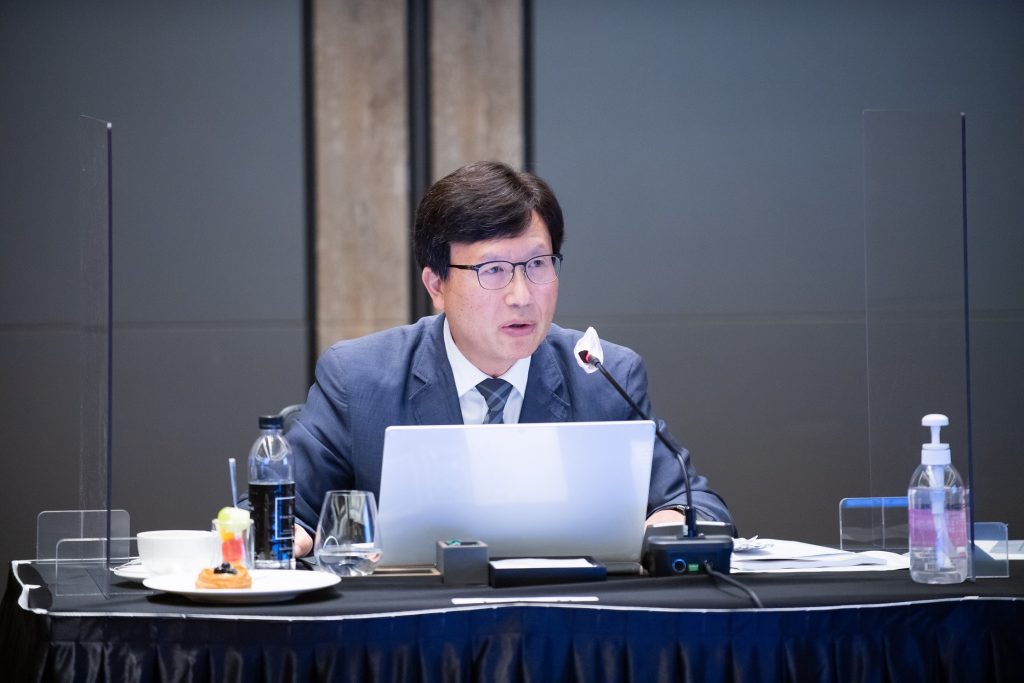To create opportunities for an ethanol renewable fuel standard (RFS) in Korea’s carbon-neutrality scenario, the U.S. Grains Council (USGC), USDA’s Foreign Agricultural Service (FAS) in Seoul and The Environment Daily News co-hosted the “Climate Crisis and Biofuel Symposium” on Sept. 8 in Seoul.
The hybrid program was designed not only to promote ethanol, but to also emphasize to key stakeholders in Korea’s 2050 carbon-neutrality policy that ethanol is the most realistic carbon reduction means in the transportation sector.
“The ultimate goal is to create an opportunity for an ethanol RFS to be included in Korea’s carbon neutrality scenario through dialogue and encouragement with key stakeholders,” Haksoo Kim, USGC’s director in Korea, said.
Youngsook Yoo, chairman of the Korea Biofuels Forum, welcomed participants and spoke on the importance of alternative fuel sources in mitigating greenhouse gas (GHG) emissions.
“We really have to take action; we have to be more aggressive in response to climate change right now,” Yoo said. “In order to limit the climate temperature rise to 1.5 degrees, we need to reduce the consumption of fossil fuels.”
USGC’s Kim and 13 other speakers and panelists took part in the program, including Daniel Whitley, FAS administrator, and Steffen Mueller, principal economist at University of Illinois-Chicago.
Whitley emphasized that the Biden administration has prioritized GHG reduction and is expanding infrastructure and research and development (R&D) investment to expand biofuel consumption in the United States. He also stressed that ethanol will be the most effective carbon-saving alternative.
Mueller’s presentation showed that fuel with high ethanol content can outperform electric vehicles in emission reduction, and if Korea adopts an E10 policy, it will save 3.1 million tons of carbon every year.
Kim focused on ethanol’s contribution to carbon neutrality with a focus on life cycle assessment (LCA) analysis.
“Korea is one of the leading countries in pursuit of carbon neutrality,” Kim said. “If Korea introduces E10, it can save 3.1 million tons of greenhouse gas emissions annually and increase the eco-friendliness of fuel by replacing harmful MTBE (methyl tert-butyl ether).”
Kim concluded by proposing that an ethanol RFS should be included in the transport sector’s carbon-neutral scenario, taking into account the various benefits.
A panel discussion followed, in which speakers gave closing remarks on the establishment of carbon-neutrality policies in the region.
“The panel suggested that bioenergy experts should be involved in establishing carbon-neutral policies and agreed that ethanol is the most feasible means of reducing carbon in the transportation sector using existing infrastructure,” Kim said.
Learn more about the Council’s ethanol work in Korea.
About The U.S. Grains Council
The U.S. Grains Council develops export markets for U.S. barley, corn, sorghum and related products including distiller’s dried grains with solubles (DDGS) and ethanol. With full-time presence in 28 locations, the Council operates programs in more than 50 countries and the European Union. The Council believes exports are vital to global economic development and to U.S. agriculture’s profitability. Detailed information about the Council and its programs is online at www.grains.org.

